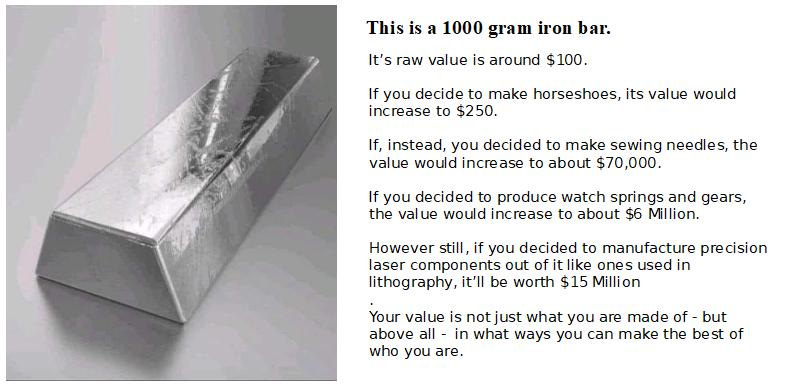Some Whackadoodle Truths
If a teacher does their job right, there will come a day when the student becomes the teacher.

“What are you working on? she asked, looking over my shoulder.
“A Whackadoodle tirade,” I replied without stopping. “We need to stop debating facts and start looking for solutions.”
“Is this about Cause and Effect?”
“What?” I nearly snapped.
“Well,” she sounded a bit uncertain. “Aren’t we supposed to be restarting the guideposts? We finished guidepost fourteen, so we are about to start the cycle again. Guidepost One: the Power of Cause and Effect.”
“Everything is about Cause and Effect,” I replied without thinking.
She shoved her face next to mine in order to see the screen. “I want to see what you’ve been working on.”
“Fine,” I said and posted the image.
“Wow, that’s pretty cool advice,” she said after reading it.
“It’s not cool enough,” I replied.
“What do you mean?”
“It’s just another Facebook meme I saw that simplifies the world too much. ‘Your value is not just what you are made of - but above all - in what ways you can make the best of who you are.’” I snorted my laugher. “Sounds great, but askes no questions and presents no solutions. Sure it’s easy to turn a hundred dollar iron bar onto fifteen million, if you have the infrastructure, innovators, supply steams, finances, and workforce to do it. And this writer’s solution is to, ‘Make the best of who you are.’”
“That sounds like good advice.” she said quietly.
“It is good advice,” I admitted. “It is pretty much all we can do, but equating it with what it takes to turn a one hundred dollar iron bar into fifteen million actual spendable dollars is far too simplistic and sets people up for failure. Memes make everything far to simplistic and divisive. Did you know there is a whole webpage on Snopes.com devoted to Einstein meme quotes that he did or didn’t say?” I looked up and sighed. “I love Snopes.com. They either confirm the quote and tell you where you can find it, or they give credit to the original speaker, or they say there are too many contradictory stories to make a definitive answer. They cite and fact check everything they post. They even have a link where you can ask them a question, so they can fact check it. Much better than Bing’s AI, who cites Goodreads all the time when you ask it to verify a quote.”
“What’s Goodreads?”
“It’s an online website for book lovers where they can post their favorite quotes, but they are never asked to cite the quotes. You know, tell people where they can find the book and read the quote in context. The quotes posted there are impossible to verify. They always say who wrote it, but they seldom include the book and page number so a person can read the quote in context. They could quote my first book in which I quoted Emerson, and their quote would be wrong.”
“What do you mean?
“I wrote about a quote that I’d read in a well respected book. It was supposed to be Emerson’s definition of success. I used to use it in my lectures because it is so lovely.” I looked for the quote online and added it.
To laugh often and much; To win the respect of intelligent people, and the affection of children; To earn the appreciation of honest critics, and endure the betrayal of false friends. To appreciate beauty, to find the best in others; To leave the world a little better; whether by a healthy child, a garden patch, or a redeemed social condition; To know even one life has breathed easier because you have lived. “Turns out,” I added. “Emerson didn’t write it. The bones of it were written by Bessie A. Stanley of Lincoln, Kansas, in response to a local contest asking that entrants define success in less than a hundred words. Her original entry was: “He has achieved success who has lived well, laughed often and loved much; who has gained the respect of intelligent men and the love of little children; who has filled his niche and accomplished his task; who has left the world better than he found it, whether by an improved poppy, a perfect poem, or a rescued soul; who has never lacked appreciation of earth’s beauty or failed to express it; who has always looked for the best in others and given the best he had; whose life was an inspiration; whose memory a benediction.”
“She won $250 dollars in 1906 for that entry. Then, in 1951, a famous American psychologist and eugenicist, named Albert Edward Wiggam was asked “What is success?” Wiggam decided to answer by presenting what he claimed was an abridged version of statements that he credited to Ralph Waldo Emerson because, of course, quoting Ralph Waldo Emerson is much more impressive than quoting a Mrs. Bessie A. Stanley of Lincoln, Kansas. His interview got read by others, and soon everyone was quoting it, even Ann Landers and Dear Abby; and they always cited Emerson. I keep seeing that misquote circulate in memes today, and I want to correct it. I want to give Ms. Bessie the credit she deserves.”
“And that’s your tirade? Internet memes?”
“Memes are a cause; they have an effect.”
“But do you have a point?”
“I always have a point,” I said pointing my pointy finger at her pointy face.
She swatted my finger away, laughing. “No I mean, what do we do about it all the Fake News and misleading memes. Cause and effect always has to come back to what we can do, or else we are helpless, right?”
“Right,” I said, nursing my pointy finger. “So I suggest three things, or maybe four. I will let you know once we’ve done writing. One: Whenever you see misleading memes, kindly point out any facts you can confirm, and ask them to do the same. Have a civil conversation even if it is just online. Ask them to cite their sources. Like the other day when a friend posted this image:
“I wrote a comment saying that I didn’t think that the great Graham Green would appreciate his image used to promote a t-shirt that he had never worn. She wrote back, ‘How do you know?’ Her reply kind of stumped me. I mean, was she asking me how I knew he might not appreciate it, or how I knew he had never worn the t-shirt? I decided to go with the later and replied with this original promotional photo from the movie Clearcut, pointing out that there were no words on the t-shirt when he wore it, and suggesting that it was an amazing film that she might hate, but I recommended anyway because it is one of my favorites.”
“What did she say after you posted it?” she asked.
“She seemed a bit upset that I would assume that she would hate one of my favorite films. She’s right about that. Assuming is always wrong. She mentioned that she really had just been interested in the actor’s bio that was posted along with the fake picture, and suggested that I contact the actor directly to tell him what was going on, ‘You know how with your Hollywood experience.’”
“Dang,” she sat back thoughtfully. “But wouldn’t he already know about the t-shirt?”
“Of course he knows about the t-shirt, and maybe he loves having his image used without permission to sell t-shirts he never wore. Sorry, I’ve did meet a lot of people working in Hollywood, but that doesn’t mean I have every great actor’s number on speed dial. And I am not going to bother his agent and manger with what they already know. The man has a life of his own.”
“Doesn’t sound like it was a ‘civil conversation’ with your friend,” she pointed out.
“No, it wasn’t,” I think I snapped. “I never even replied.”
She sat back and crossed her arms across her chest. “I think the reason you are venting about memes has more to do with your friendship, and less to do with Facebook memes,” she finally concluded. “You no longer know how to talk to her.”
“Wrong,” I snapped again, but paused to take a breath. “And right. I don’t know how to speak with her. It’s hard to speak with anyone on Facebook. It’s all about posts, comments, and reactions, but when I see a friend post memes that I know to be misleading, I feel compelled to point it out. She may think I am attacking her, but I am attacking the memes. I can’t tell you how often tracing down those memes have lead to extraordinary people whose words and thoughts have been stolen from them, or how often the words of those quoted are paraphrased, taken out of context and given a whole new meaning. Whenever I see a meme quoting someone famous, I feel compelled to fact check.” I stopped, suddenly exhausted. “Following those memes to there origin always lead me to the unexpected.”
Her arms were still crossed as she looked at me. “So what is really going on?”
“I am addicted,” I admitted. “I have a compulsion to fact check everything I see. Oh, I get that most people are posting stuff without checking sources. Memes are emotional. Memes are fun. People see an image they like and hit share. They don’t care if it incorrectly credits someone. They just want to pass on the cute dog with the cool quote about ‘My best friend is the one who brings out the best in me.’ They don’t care that the quote is from Henry Ford, a well documented antisemite who writings were quoted by Hitler in Mien Kampf.” I lifted my hand and rubbed my face. “Maybe I’m just taking it all too seriously.”
“You are actually sounding like that student you wrote about in your first book,” she informed me. “The woman who made the same argument to her husband over ten-thousand times, expecting a different result. Isn’t that Einstein’s definition of insanity? Doing the same thing over and over again, expecting a different result?”
I looked though my fingers to reply, “You do know that there is no evidence that Einstein ever either said or wrote that, don’t you?”
“Yes, I know,” she laughed. “You’ve told me before. But whoever said it…it is still good advice. So, do you think you are accomplishing anything with your compulsive fact checking of your friends’ memes?”
“No,” I said through my hands.
“So it’s time to do something different.” She clapped her hands. “Let write an article about the most annoying meme you’ve seen, and post it on Facebook. It won’t be a comment. It will be a post you can share, and others can share as well. In fact, I think we should start a group on Facebook for people who have a compulsive need to fact check Facebook memes.”
She always amazes me. After a few questions and fifteen minutes, she had the post ready to send. Not the best picture, but whatever.
A Whackadoodle Fact Check: Was Einstein a Socialist?
What he really said was this: Private capital tends to become concentrated in few hands, partly because of competition among the capitalists, and partly because technological development and the increasing division of labor encourage the formation of larger units of production at the expense of smaller ones. The result of these developments is an oligar…
“Now,” she added happily. “We can set up a Facebook group where you can post your tirades, and you can meet with others who feel your compulsion to fact check as well. We can let them post their own fact checks. We can all fact check each other together. Doesn’t that sound better that what you have been doing?”
“Yes, it does” I had to admit. “And I already know my first post.”
“Good,” she grinned. “Since you are addicted to fact checking, I think we should call it Fact Checkers Anonymous.”
“Fact checking can never be anonymous,” I warned. “The whole point of fact checking is to know your source.”
“Fine.” she shrugged. “Let’s call it, ‘Fact Checkers: Addicted but not Anonymous.’ You can invite your friends and see if any of them care.”
“It might end up being a group of one,” I told her.
“Nope,” she smiled. “I know at least one friend who will join the group as soon as she gets home.”
P.S.
We did actually create the group. In the end, we called it Facebook Fact Checkers--For People Addicted to the Truth. We will see if anyone joins.







